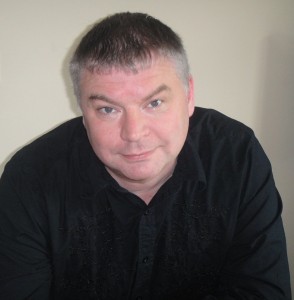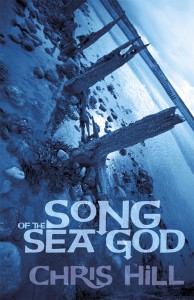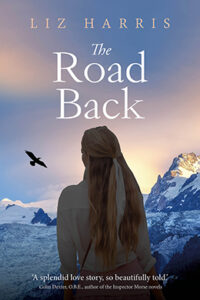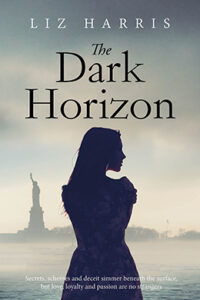One of the most enjoyable things about this year’s Chipping Norton Literary Festival was meeting author Chris Hill and having a most enjoyable conversation with him. I thought that you, too, would enjoy meeting Chris, so here goes …
First of all, Chris, let me say congratulations on winning one of Britain’s biggest story awards, The Bridport Prize, and on the publication of Song of the Sea God, your first full-length novel, which has already been shortlisted for two national awards including the Daily Telegraph Novel in a Year prize.
Thanks for having me, Liz – lovely to talk to you on your blog having met you recently at the Chipping Norton Lit Fest!
Song of the Sea God has been described as ‘a visionary and delightfully bizarre novel’. Where did the idea come from for the book?
I suppose the honest thing to say is that the idea evolved. The book is about a man who washes up on a small island off the coast of England and tries to convince the local people he is a god. Perhaps it began with wanting to write about the nature of god and religion in people’s lives – what faith means to them. I’m not particularly religious myself and I guess I’d describe myself as agnostic – but saying that I don’t know the mysteries of the universe is not the same thing as saying I think there are no mysteries. So I wanted to write a book about the god shaped hole in people’s lives – with jokes.
The research for a novel that takes the reader on a ‘microcosmic wild ride’ must have created particularly challenging problems. How did you set about your research?
Well, I made some of it easy for myself by setting the book on the island where I grew up – Walney Island off the coast of Cumbria. That meant I knew where everything was, the geography of it was second nature to me which gave it a basis in reality.
But the characters and the plot are nothing to do with Walney or the people there. There was a lot of research went into the rest of the book – everything from how to do psychological magic tricks like cold reading, through to the beliefs and traditions of ancient religions.
I’m flattered that since publication I’ve had experts in some of these areas tell me they think it rings true. That’s down to reading lot of library books, plenty of research on the internet and so on. I think as far as research goes, it’s always best to know more than you put on the page – it should inform what you write, rather than cause you to regurgitate information like a school essay!
Which did you find the hardest part of the novel to write, and how did you overcome any problems?
The ending is pretty intense. The way I structured it, the book starts out quite calm and even light-hearted, then gets gradually darker. There are some genuinely disturbing scenes which I think work for the reader partly because of what’s gone before. I just had to go for it, in the knowledge that what I was describing was backed up by research and in the hope that my readers would be invested enough in the plot and characters by that stage to ride the tiger with me.
What is your own favourite novel, and are there any particular novelists who have inspired you?
Hard to name just one isn’t it? I suppose my first love was the work of the American novelists of the last half of the 20th century – now recently deceased. People like Updike, Heller, Vonnegut, Bellow. They combined fabulous writing, great narrative voices and amazing plots and characters.
The novels that Sea God most often gets compared to are different ones though – all great works of course and I’m very flattered. People have said Lord of the Flies, they’ve said Tin Drum by Gunter Grass, Perfume by Patrick Suskind, then there’s The Heart is a Lonely Hunter by Carson McCullers, The Magus by John Fowles, the list goes on. I can see what people mean with all of those. A curious one I had was someone telling me I wrote a lot like Magnus Mills in The Restraint of Beasts – but I’d never read the book. I have now and love it. How can you write like someone you’ve never read? I guess perhaps we had similar influences?
What is the worst thing anyone’s said to you?
I’m guessing you mean in terms of writing here rather than say, romantic rejection? I’m going to assume you mean writing. The first novel I wrote was a kind of thriller – it was me trying to be liked, trying to be conventional and popular. One agent who rejected it said it was too ‘safe.’ I thought right – next time I’m going to give full vent to my imagination, and nobody is going to get to call it safe. So I wrote Sea God – my tale of a would be god told by a dwarfish mute on an island full of magic. And nobody has said it’s safe!
Would you tell us something about your next novel?
It’s called the Pick Up Artist and it’s lighter and gentler than Sea God. It’s a kind of rites of passage book about a young man’s attempt to attract women using the PUA system of ‘psychological techniques’ which he hopes will persuade them into bed with him.
And lastly, a question I’m sure that readers will be asking, Where can we buy a copy of Song of the Sea God?
It’s published by Skylight Press and the simplest way is probably through Amazon. Just click here.
Thanks very much, Liz – great to talk to you! If people want to link up with me they can find me here:
Twitter: @ChilledCH
Blog: http://songoftheseagod.wordpress.com/
Facebook: https://www.facebook.com/chris.hill.3726?ref=tn_tnmn




What a very interesting interview. Thanks, Liz and Chris. The concept of a person coming from the sea and pretending to be a god is most unusual. Can’t wait to read it! X
I, too, thought it sounded intriguing, Mandy. It’s on my to-be-read pile. It’ll be a change, having done A level Latin, to read about a ‘god’ that doesn’t appear in the classics of Ancient Rome and Greece.
Growing up in Australia, at school we were taught that some Pacific islanders thought the visiting Europeans were gods when they first made contact.
It will be interesting to read a modern fiction take on the same thing.
I always enjoy something out of the box.
I was taught that, too, Janet, but I’d completely forgotten. I’m glad you’ve reminded me. It’s certainly a very interesting premise for a novel.
I thought of cargo cults too, Janet. although we don’t know yet whether or not this sea god brings wealth and abundance.
Some interesting comparative books there, Chris, and mainly in my ‘admired’ rather than ‘loved’ books (though have never been able to get through The Tin Drum… but you’ve reminded me to revisit my favourite John Fowles novel, Daniel Martin) but, wow, congratulations!
Many thanks, Chris. I absolutely love ‘The Heart is a Lonely Hunter’. Anything compared with that is a must-read for me.
What an interesting interview, Liz and Chris. When you described Song of the Sea God I immediately thought of a Gabriel Garcia Marquez short story I read recently called A very Old Man with Enormous Wings – except that it was the superstitious villagers who thought he was an Angel. I loved the concept.
Your story – and the way you’ve approached it – sounds wonderful.
Confession time, Beverley – I have never read anything by Gabriel Garcia Marquez. I must remedy that.
First of all, massive congratulations to Chris for winning that most prestigious of awards….The Bridport Prize. I’m in awe already ….:)
Great interview and it’s good to know thinking outside the box can pull in massive readership. Good interview, Liz, and most excellent interviewee, Chris.
Many thanks for your comments, Linda. Yes, Chris as an excellent interviewee.
Thanks all – loved doing the interview and brilliant to read such kind comments. I too had cargo cults as one of the things I had in mind when I was researching and writing – they have always struck me as a great example of the way religions evolve. I love Marquez but must confess I’ve not read that particular story – I will have to take a look!
Great interview, and I really like the premise of “Song of the Sea God”. Intriguing!
‘Intriguing’ is what everyone is saying, Henriette. It was my thought, too. It sounds a most unusual novel, and one that I’m looking forward to reading.
Great interview, and the book sounds intriguing.
Many thanks for your comment, Liv. I’m glad you enjoyed the interview with Chris.
What an interesting writer. Just got to all this. A very interesting interview with responses. Refreshing as the work this author writes is very original.
Your comment hits the nail on the head, Carol – Chris’s novel sounds extremely original. Thank you for your comment.
Very interesting interview and a thoroughly intriguing novel. Definitely to be added to the TBR pile. Lovely to hear how after rejection Chris went on and came back with something stronger.
How interesting that you’ve picked up on this part of the interview, Jules. It is interesting how the rejection stimulated Chris into something that was the antithesis of the criticism. Thank you for your comment.
Great interview and congratulations Chris on winning the Bridport Prize. It certainly sounds a fascinating and very different sort of story.
Thank you very much for your comment, Angela.
Great to know that writing what you loved paid such dividends, Chris. From your description, I can see the parallels with The Magus and Tin Drum. Well done for pushing the boundaries
Many thanks for your comment, Zana. I shall be interested in seeing if I can see the parallels with ‘The Heart is a Lonely Hunter’, which I love.
Hi Liz and Chris,
wow what can I say brilliant interview Liz and I can’t wait to read it Chris especially as I live in Barrow and visit Walney all the time. Congratulations on your amazing success which is fabulous 🙂
I’m in the process of having my debut novel published by Carina and it’s set around Furness Abbey and Abbotswood. I’m pretty sure you will be very familiar with those places, it’s about time Barrow and Walney got some good press.
Helen x
How interesting that you know Walney, Helen. Thank you so much for your comment. And good luck with your novel. I’m assuming that it’s written in the name you’ve used here and will watch out for it.
A great interview, Chris and Liz, full of fascinating insights into the creative process.
I’m glad you enjoyed it, Margaret. I thought Chris’s replies to my questions were very interesting, and they certainly showed what a positive force rejection can be.
Thanks again for all the kind comments – yes, it is useful if you can turn rejection into something positive I think – not that it’s always possible! Good luck with your book Helen, nice to hear of another author from Barrow!